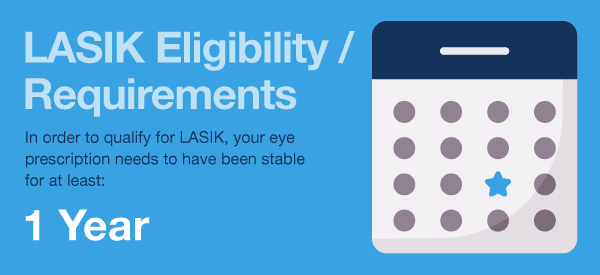
Medically Reviewed by Jonathan Pirnazar, M.D. NVISION Surgeon
8 LASIK Requirements to Know About
Last Updated:

Medically Reviewed by Jonathan Pirnazar, M.D. NVISION Surgeon

Article At a Glance
To be eligible for LASIK surgery, candidates should meet the following criteria:
- Age: Must be at least 18 years old.
- Stable Vision: Prescription should remain unchanged for at least one year.
- General Health: Should be in good overall health without conditions that impair healing.
- Eye Health: Free from diseases, injuries, or infections that could affect recovery.
- Corneal Thickness: Sufficient corneal thickness to safely perform the procedure.
Meeting these requirements enhances the likelihood of a successful LASIK outcome.
LASIK surgeries begin with eligibility exams to ensure you meet qualifying requirements before you become a patient. LASIK is very safe, and just 15-20% of patients are considered ineligible. Here’s what you should know about what doctors look for before surgery starts.
LASIK Eligibility Criteria
LASIK is a visual correction procedure conducted via surgery. Most people with farsightedness, nearsightedness, and/or astigmatism are typically good candidates for surgery. Doctors use detailed pre-surgical examinations to make sure surgery is the right choice for their patients.
During LASIK, doctors use lasers to reshape the cornea. The eye can’t focus clearly, and images look blurred or distorted. With tissue removed by the excimer lasers, light can enter the eye and focus on the retina properly.
You deserve clear vision. We can help.
With 135+ locations and over 2.5 million procedures performed, our board-certified eye surgeons deliver results you can trust.
Your journey to better vision starts here.
While LASIK tools and techniques have changed dramatically since the surgery was introduced in the 1990s, eligibility requirements have not. The eligibility criteria we’ll present here have been reviewed for suitability for current patients.
1. Age
The U.S. Food and Drug approves tools used in LASIK. Currently, no lasers are FDA-approved for people younger than 18. Some people wait until they’re in their mid-20s to ensure that their vision is stable and won’t keep changing as they grow.
There are no maximum LASIK age qualifications, but some older people have underlying health issues that make surgery less ideal. A detailed exam could help a doctor to spot any potential problems.
2. Good Eye Health
LASIK is a surgical procedure that involves removing tissue. Your eyes must be healthy enough to heal after this procedure, and your eyes must be free of underlying conditions that could impair your vision after LASIK.
Eye health issues your doctor might spot during an exam include the following:
- Glaucoma
- Cataracts
- Conjunctivitis
- Infection
- Severe dry eye syndrome
- Injury
Some of these issues are treatable. For example, your doctor could help you improve your tear health to prepare you for surgery. But others could prompt your doctor to look for new ways to fix your vision.
3. Stable Vision
LASIK is a permanent solution to your current vision problem. It should be performed once, so doctors do not want to to perform surgery until your prescription stops changing. You should have a prescription that remains stable for about a year.
The American Academy of Ophthalmology says most people experience stable prescriptions between ages 20 and 30. But the following issues could lead to instability:
- Diabetes
- Pregnancy, due to hormonal changes
- Some medications
If your eyeglass or contact prescription is unstable, you could be ineligible for LASIK now, but that could change later.

4. Vision Prescription Within Range
Everyone considering LASIK struggles to see clearly, but LASIK isn’t the right surgical procedure for everyone. Very strong prescriptions, or prescriptions that are too high, could indicate that a different technique is the right choice for you.
LASIK is approved for people with hyperopia (farsightedness), myopia (nearsightedness), and astigmatism (irregular corneal shape). These conditions are measured in diopters.
FDA Prescription Requirements for LASIK
| Condition | Prescription |
| Hyperopia | Up to 6 diopters |
| Myopia | Up to -12 diopters |
| Astigmatism | Up to 6 diopters |
5. Good Overall Health
Like all surgical procedures, LASIK involves tissue healing. Some health issues and medications can impair your healing, making the recovery period following surgery riskier or more complicated.
Conditions that could make you a poor candidate for LASIK include the following:
- Diabetes
- Autoimmune diseases, including lupus or rheumatoid arthritis
- Medications, including corticosteroids and acne medications
You must be honest with your doctor about your health and come to your consultation appointment with a list of all the medications you take.
6. Thick Enough Corneas
During LASIK surgery, your doctor will create a flap with a femtosecond laser in your outer cornea. This flap is then peeled back to expose deeper corneal tissue. Then, an excimer laser reshapes deeper corneal layers to reshape your cornea to match your prescription. You must have enough tissue for this procedure to work properly.
Recent advances in LASIK procedures and tools mean doctors can work on thinner corneas than they have in the past. But if your corneas are far too thin, surgery could be a poor choice for you.
7. Adequate Pupil Size
Large pupils do not always disqualify you from LASIK, but your doctor may use advanced technology to help correct your vision.
Are you a good candidate for LASIK surgery? If you’ve been disqualified by one doctor, a second opinion might be wise. Use our candidate quiz to find out if this surgery is right for you.
8. Adequate Pupil Size
Your doctor will perform corneal mapping at the time of consultation to ensure you are a candidate for LASIK surgery
What Else Determines Patient Eligibility?
LASIK is good for people over 18, who are in good eye and general health, don’t have thin corneas, and who have had stable prescriptions for at least one year.
Your health is part of your LASIK eligibility. Your knowledge is the other part. The ideal LASIK candidate will be well informed about the surgery, so you understand exactly what to expect.
At NVISION, doctors spend time with each of their patients. Pre-surgical exams help them ensure that patients qualify for surgery, but these conversations also ensure that you know exactly what will happen before, during, and after the procedure.
At NVISION, we follow FDA requirements regarding patient eligibility. But we also work with patients to help them get ready for surgery, treating issues when appropriate. Sometimes, we can help patients who were turned away by others.
You deserve clear vision. We can help.
With 135+ locations and over 2.5 million procedures performed, our board-certified eye surgeons deliver results you can trust.
Your journey to better vision starts here.
What to Explain During the Candidacy Evaluation
Your doctor will perform a detailed exam before scheduling LASIK surgery. Expect to set aside an hour or two, and prepare for a conversation and educational session. By the time the appointment is complete, you’ll understand whether LASIK is right for you.
Your doctor might discuss the following topics:
- Medical health: During your pre-LASIK exam, your doctor will assess your eyes very carefully.
- Medications: Certain medications, such as immunosuppressive drugs, can decrease the functions of your immune system and raise the risk factors of surgeries like LASIK.
- Employment: Even though the risks are negligible, some professions will not allow these types of procedures.
- Cost: Many insurance plans won’t cover the cost of LASIK surgery. Ensure you can pay for surgery before it starts. Check if your insurance offers discount plans for LASIK, so you pay less than the standard price for your surgery.
- Contact sports: If you regularly participate in football, hockey, wrestling, or other physical activities, blows to the face could harm your LASIK site and vision.
During your examination, you’ll have a chance to ask questions. These are a few that could be wise to discuss:
- Am I a good candidate for surgery?
- Am I likely to get the good results I want?
- What side effects should I expect?
- How many LASIK surgeries have you completed?
- What is your success rate?
The NVISION LASIK consultation takes several hours and is designed to determine if you’re a good candidate for surgery, both physically and mentally.
Frequently Asked Questions About LASIK Qualifications
These are the questions we commonly hear about LASIK qualifications, along with answers from our experts.
If you’re disqualified by one doctor, consider asking for a second opinion. If you’re ineligible due to physical conditions, consider returning when they’re treated, or ask your doctor about alternatives to LASIK.
People who aren’t eligible for LASIK could benefit from other procedures, such as the EVO ICL procedure for people with myopia or the PRK procedure for those with thin corneas.
Eye health conditions (such as glaucoma), physical conditions (like diabetes), some medications, lifestyle choices, and other issues could make you a poor candidate for LASIK surgery. Your doctor could tell you more in a consultation.
Yes. People with prescriptions stronger than those recommended by the FDA could be poor candidates for surgery. Other procedures may be an option, such as EVO ICL, and/or PRK.
People with blurred vision due to astigmatism, nearsightedness, and/or farsightedness can benefit from LASIK surgery. The procedure could reduce your reliance on glasses or contacts. Your doctor can tell you more.
You deserve clear vision. We can help.
With 135+ locations and over 2.5 million procedures performed, our board-certified eye surgeons deliver results you can trust.
Your journey to better vision starts here.
References
- Are You a LASIK Candidate? 5 Guidelines You Should Know. (August 2022). Refractive Surgery Council.
- What Is LASIK? (January 2021). U.S. Food and Drug Administration.
- When Is LASIK Not for Me? (July 2018). U.S. Food and Drug Administration.
- Will High Myopia Ever Stabilize? (November 2021). American Academy of Ophthalmology.
- What Are the LASIK Prescription Requirements and Limits? (August 2022). Refractive Surgery Council.
- Calculation for LASIK Ablation. (December 2022). American Academy of Ophthalmology.

Dr. Pirnazar is known as the one of the best LASIK surgeons in Orange County, California. Having performed over 55,000 refractive and cataract surgeries, Dr. Pirnazar’s specialties include LASIK, PRK and cataract surgery. Thanks to his expertise, Dr. Pirnazar and his partners at NVISION were selected to be the official team ophthalmologists for the Los Angeles Chargers.
This content is for informational purposes only. It may have been reviewed by a licensed physician, but is not intended to serve as a substitute for professional medical advice. Always consult your healthcare provider with any health concerns. For more, read our Privacy Policy and Editorial Policy.

